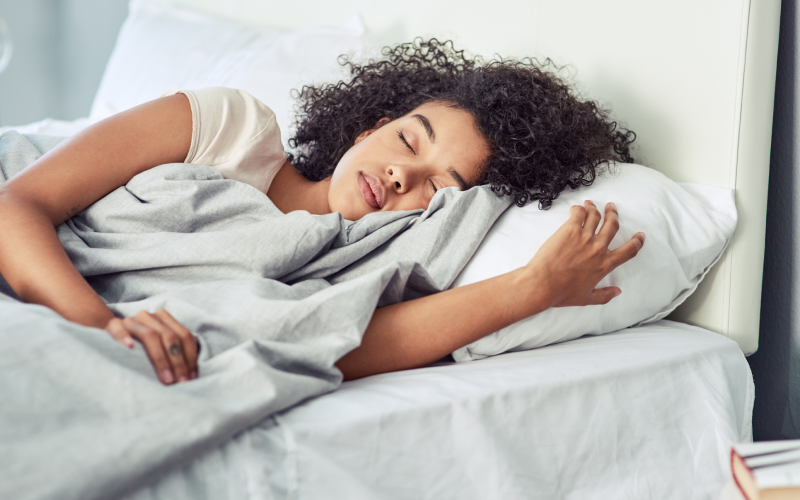Buy One, Get One 50% OFF Eyeglasses
* Restrictions apply. Ask a Team Member for details.

Tips on How to Rest Your Eyes Effectively
After a long day at work, on a road trip, or even reading a good book from cover to cover, you may notice that your eyes feel tired. Why? This is because your eye muscles strain when you spend a long time intensely focusing your eyes on an object, such as your phone or even the road while driving.
This eye strain is often called eye fatigue, which is a common problem that’s often left untreated. When eye fatigue is caused by a digital device, it’s often referred to as “digital eye strain”.
Eye strain, regardless of the cause, is uncomfortable. There are some ways you can relieve your eyes.
Continue reading to learn more about how to effectively rest your eyes from The EyeDoctors optometrists.
Tip 1: Use a Warm Compress
Closing your eyes for a few moments can help to relax your eye muscles and placing a warm compress over your eyes can feel soothing.
To do this, run a clean washcloth under hot water until it's fully drenched. Then, squeeze out the excess water so that the washcloth is damp, but not dripping water.
The next step is to fold the washcloth to fit the size of your face and eyes. Before placing the washcloth over your eyes, allow a moment for it to cool off so that it is warm rather than hot.
Find a comfy place to sit or lay down, then place the warm cloth over your eyes for a few moments.
Pro-Tip: Use Teabags Instead
If you don't have a washcloth handy, tea bags will also work to eliminate the effects of eye fatigue. Steep the teabags in boiling water and then allow them to cool – never place a hot tea bag directly on your eyes.
For warm compresses, allow the tea bags to sit at room temperature for a few minutes. If you’re wanting to create a cool compress, put the teabags in the refrigerator after boiling for a few minutes.
Be sure to squeeze any liquid out of the teabags before placing the hot or cold tea bag on your eyes. Keep your eyelids closed when using the teabags. This will reduce the chance of getting tea into your eyes.
Tip 2: Practice Eye Exercises, or Eye Yoga
Practicing eye exercises regularly can prevent and ease eye fatigue. They require no supplies, making it easy to give your eyes a break anywhere.
While the effects of yogic eye exercises haven't been well studied, one study found that after performing regular yogic eye exercises for six weeks, participants experienced a statistically significant reduction in eye fatigue.
Try practicing these eye yoga techniques several times a day to improve your eye health.
Eye Rolling
Some eye yoga exercises may have you look side to side or up and down. This makes your eye muscles move in ways you normally don't when focusing on something in the center of your field of vision.
Blinking
Other eye yoga exercises can involve blinking, which encourages you to blink more often throughout the day. This reduces the risk of dry eye.
Palming
Yet another exercise may involve "palming," which is when you cup your hands and place them over your eyes without applying pressure. Palming helps your eye muscles relax in a dark environment.
Tip 3: Keep Your Eyes Well Hydrated
Those with dry eyes may experience eye fatigue more often. Follow these tips to prevent dry eyes:
Avoid direct airflow toward your eyes
Drink 7-8 glasses of water per day to stay hydrated
Get 7-8 hours of sleep each night
Stay away from smoke
Use an air humidifier in your home or office
Learn more about dry eye from The EyeDoctors.
Tip 4: Try Blue-Light Glasses
Too much glare from a computer screen over the course of a day may cause dry eye or eye fatigue. If you can't cut down on your screen time, don’t worry – some glasses can help.
These glasses have blue-light-blocking lenses, which reduce or eliminate your eye’s exposure to blue light. The lenses are covered with a special tint that minimizes the amount of blue light that reaches your eyes. It’s even possible to add the blue-light filter to your prescription glasses.
Not wanting to wear a pair of blue light glasses? Try using special filters that fit over computer screens, as these can help block harmful glare and blue light.
Tip 5: Visit Your Eye Doctor
Your eyes may feel tired because they're working too hard focusing. If you find yourself frequently squinting to read a recipe or struggling to see objects in the distance, you may need glasses. If you already wear glasses or contacts, your prescription may have changed since your last visit to the eye doctor.
Your eye doctor can also recommend lenses to block blue light or other strategies that can help you effectively rest your eyes.
Schedule an Eye Exam Today
The EyeDoctors’ skilled team of optometrists offers comprehensive eye care with the latest technology. We also treat and provide preventative care for many eye conditions, such as macular degeneration and glaucoma.